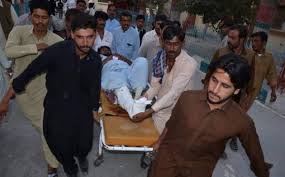
Pakistan ’s security forces killed at least 39 militants in a coordinated crackdown across the country a day after an Islamic State suicide attacked a popular and crowded Sufi shrine in southern Sindh province that left 80 people dead and about 250 injured. The bomb blast at the shrine of Lal Shahbaz Qalandar on February 16 was one of the major terror attacks in Pakistan in recent years and followed a string of several extremist strikes this week.
Paramilitary unit Sindh Rangers said they killed 18 terrorists in overnight operations in Sindh province. Of them, 11 were killed in Karachi.The crackdown was launched in a coordinated manner by Pakistan’s federal and provincial governments after at least eight terror attacks rocked Pakistan over the week, killing dozens. A meeting chaired by Prime Minister Nawaz Sharif this week participants agreed that militants posed a threat to national security and should be “liquidated”.
Karachi, hub of anti-jihadi militants
The latest burst of terror strikes in different parts once again raise serious question marks about the efficacy of Pakistani security forces anti-militancy operations. But more importantly, the killing of 11 terrorists in the port city of Karachi served to reinforce the view that it is a hub of anti-India jihadist outfits and criminals who often enjoy the backing of the Pakistani security establishment.A fresh corroboration of this finds mentioned in a report released by Brussels-based think- tank, International Crisis Group which says terror groups like Lashkar-e-Taiba, its parent outfit Jamaat-ud-Dawa, Maulana Masood Azhar led Jaish-e-Mohammad and anti-Shia group Lashkar-e-Jhangvi have “umbilical links with Karachi’s large, well-resourced madrassas”.
These groups, according to the report, fight a turf battle in Karachi as they run madrassas and charity fronts flush with huge funds.The ICG’s report titled “Pakistan: Stoking the fire in Karachi” details how a deadly cocktail of ethnic, political and sectarian strife and jihadists have turned Pakistan’s largest and wealthiest city of Pakistan into a terrorist hotspot. Karachi is the place where Dawood Ibrahim, one of India’s most wanted terrorists, is believed to be living with active patronization of the security establishment.
The lack of sincerity behind the Pakistani security forces drive against militants is also brought out by the ICG report which says that the drive by Pakistan Rangers have left out several localities of Karachi and its outskirts which are considered strongholds of terror outfits like LeT-JuD and Jaish-e-Mohammed.The report quotes elected representatives, senior officials, journalists, civil society activists and sources from the ground to say that while many terror masterminds, who had fled Karachi by September 2013 anticipating the Rangers’ operation, may now be back buoyed by lack of action.
The ICG quoted a retired senior provincial official of Pakistan as saying that whenever tensions between India and Pakistan flare up, these terror groups mobilise in the heart of Karachi.“….You can’t treat (LeT and Jaish-e-Mohammed) as your friends in one part of the country and your enemies elsewhere,” said the report quoting the official.
The report says well-funded jihadist organisations operate in Karachi proactively luring young men for radicalization.A police officer from Karachi, as quoted by ICG, said Pakistan cannot view law and order challenges in isolation and must look at them in the context of foreign policy choices. That is a tall order in a country where state-sponsored terrorism is part of a conscious policy decision.
Author Profile
- India Writes Network (www.indiawrites.org) is an emerging think tank and a media-publishing company focused on international affairs & the India Story. Centre for Global India Insights is the research arm of India Writes Network. To subscribe to India and the World, write to editor@indiawrites.org. A venture of TGII Media Private Limited, a leading media, publishing and consultancy company, IWN has carved a niche for balanced and exhaustive reporting and analysis of international affairs. Eminent personalities, politicians, diplomats, authors, strategy gurus and news-makers have contributed to India Writes Network, as also “India and the World,” a magazine focused on global affairs.
Latest entries
 DiplomacyJanuary 5, 2026India walks diplomatic tightrope over US operation in Venezuela
DiplomacyJanuary 5, 2026India walks diplomatic tightrope over US operation in Venezuela India and the WorldNovember 26, 2025G20@20: Africa’s Moment – The Once and Future World Order
India and the WorldNovember 26, 2025G20@20: Africa’s Moment – The Once and Future World Order DiplomacyOctober 4, 2025UNGA Resolution 2758 Must Not Be Distorted, One-China Principle Brooks No Challenge
DiplomacyOctober 4, 2025UNGA Resolution 2758 Must Not Be Distorted, One-China Principle Brooks No Challenge India and the WorldJuly 26, 2025MPs, diplomats laud Operation Sindoor, call for national unity to combat Pakistan-sponsored terror
India and the WorldJuly 26, 2025MPs, diplomats laud Operation Sindoor, call for national unity to combat Pakistan-sponsored terror







